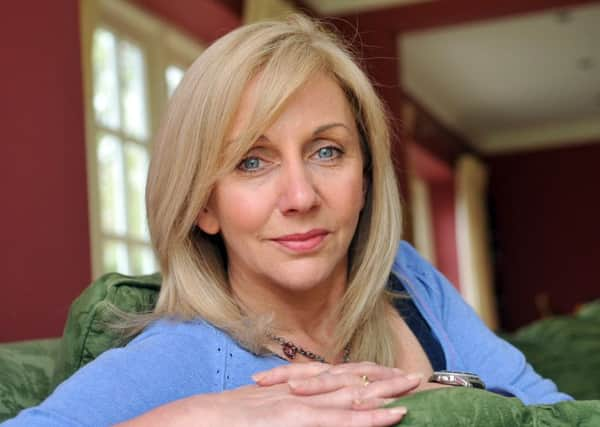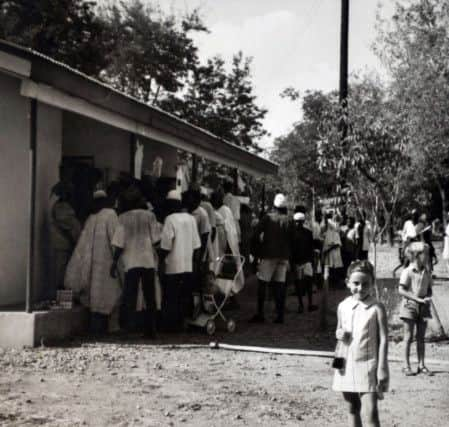Bringing war home to the youngest readers


When Hilary Robinson is at her most productive it often looks like she’s not doing very much at all.
As an author of more than 40 children’s books, Hilary can rattle off a story in a couple of hours, but it’s coming up with the idea which takes time.
Advertisement
Hide AdAdvertisement
Hide Ad“It’s what I call my ponderland period. Honestly, sometimes I spend weeks just sitting and thinking. I know that I risk looking completely vacant, but when you’re writing for very young readers, the real work is done in the mind.


“There is only limited space to tell a story and you have to keep the vocabulary simple, so before I write the first word I have to know where I’m heading. I think that’s why I always think of the ending first, it gives me a focus, a destination to aim for.”
She’s also not afraid to tackle difficult subjects. Aimed at four to seven-year-olds, previous books have covered adoption, divorce and homelessness, but when she had an idea for a series which looked at the First World War she feared she might be entering an already crowded market. In fact the opposite was true.
“The more I looked the more I realised that there was very little aimed at very young children. In fact apart from a reissue of The Little Hen and the Great War there was nothing.
Advertisement
Hide AdAdvertisement
Hide Ad“I suppose publishers thought there wouldn’t be the demand. Much of the emphasis in this centenary year has been on secondary school children, but it seemed to me that it’s only right that younger children share in the anniversary and develop an appreciation of the scale of the suffering which shaped the 20th century.”
Hilary’s great uncle died on the 10th day of the Battle of the Somme in 1916 – his body was never found, but his name is recorded on the Thiepval Memorial – and having spoken to illustrator Martin Impey, whose great uncle also fell at the Somme they decided their next collaboration would commemorate those who served in the Great War.
Where the Poppies Now Grow came out earlier this year, the second book in the series The Christmas Truce – The Place Where Peace Was Found is just out and the trilogy will be completed next year with the release of Flo of the Somme, inspired by the animals who became part of the war effort.
“There are some really beautiful stories which emerged from the First World War which really lend themselves to children’s books. The Christmas Truce was a remarkable moment in history and it illustrates the similarities of these young men who found themselves on the opposite sides of the battleline.”
Advertisement
Hide AdAdvertisement
Hide AdWhere the Poppies Now Grow has been nominated for the 2015 Carnegie and Kate Greenaway Medal and to Hilary its success is further proof that there is a market for children’s books on themes considered too niche by the mainstream publishers.
“That was why I set up my own publishing arm. A big publisher might look at a children’s book on divorce and think, ‘Will it sell? Can I take that risk? I guess it all began when my sister-in law was diagnosed with breast cancer when she was just 32-years-old. Quite quickly it became clear that she wasn’t going to survive, but she lived for seven years and worked for as long as she could. My own children were quite young and we were always honest about what was happening, but after her death I decided to write a book partly as a way of dealing with my own grief.
“It was an incredibly personal book and I never intended it to be published as I couldn’t bear the thought of someone else editing it.”
The Copper Tree, in part inspired by a project run by St Gemma’s Hospice in Leeds which allows bereaved relatives to inscribe the name of their loved one on a permanent memorial, follows the illness and eventual death of a much loved teacher through the eyes of a child.
Advertisement
Hide AdAdvertisement
Hide AdDespite her initial reluctance to publish the book, three years ago when a friend died also from breast cancer, Hilary had a change of heart.
“She had left three children and the family couldn’t find any books which really dealt with the death of a person. They’d found lots of books which featured animals, but they wanted something which was more honest. If you talk to a child about ‘losing’ a loved one, they often think they will find them again some day. The language needs to be clear and while I didn’t want to talk about the notion of heaven, what I really wanted to get across in The Copper Tree was the idea that the memories and legacy we all leave behind are everlasting.”
Hilary pinpoints the moment she fell in love with reading to the period she spent in Nigeria as a young child. Born in Devon, her family moved out to Africa when she was just five years old.
“Nigeria was where I first came across the Dr Seuss books. Two years after we arrived the civil war broke out and that meant we were subject to an evening curfew. As a child I didn’t really understand what was happening, instead I just used to lose myself in the Cat and the Hat books. I thought they were just extraordinary, they were like nothing else I had read before.
Advertisement
Hide AdAdvertisement
Hide Ad“While it was clearly a really turbulent time in Nigeria’s history I don’t remember being frightened. Even on the day when our car was stoned on the way to Sunday School, I never felt we had been singled out. We had just been unlucky and I think our parents shielded my two sisters and I from the worst of the trouble.”
Hilary’s father worked as an economics lecturer, and encouraged his three daughters to be voracious readers.
“He really was an incredible man and very modern in his thinking. I never knew what he believed in, if anything, or how he voted because he never said. He thought that if he talked about his own beliefs it would inevitably end up influencing us to think the same way and he wanted to come to our own conclusion about religion and politics. Often when we were having discussions around the dining table he would deliberately play devil’s advocate. He wanted to challenge us and make sure we were saying what we believed in rather than what we had heard someone else say. That was a great lesson to learn early on in life.”
The family eventually returned to England, settling in Yorkshire at what she describes as an exciting time for education. Sir Alec Clegg was then the chief education officer for West Riding and was a great believer in the importance of arts.
Advertisement
Hide AdAdvertisement
Hide Ad“I was lucky really, at that time there was a big emphasis on the arts and the importance of an education which was creative rather than simply learning from rote. I’ll never forget the day my teacher Mrs Garritty turned to me and said, ‘Hilary, I think you could be a writer one day’. It took me a while to prove her right, but those words always stayed with me.”
Hilary initially worked in television and radio production, including a spell on TV-am’s Wide Awake Club with Timmy Mallett. However, she was finally inspired to put pen to paper after the birth of her first child.
“When Sophie was very little she was terrified of spiders. She couldn’t bear to be in the same room as one and I thought it might help ease her phobia if I wrote a story about a little girl who felt the same way. From that book I managed to get an agent and well, the rest is history.”
That was back in 1995, but while Hilary’s two daughters are now in the 20s she hasn’t lost any of her early passion for children’s books. “I am at my happiest thinking of new ideas. Getting children switched onto reading at a young age is incredibly important. I know just how much books meant to me as a child and if I can fire another child’s imagination, then that’s a real privilege.”
• Where the Poppies Now Grow and The Christmas Truce – The Place Where Peace Was Found are available to order at www.hilaryrobinson.co.uk.